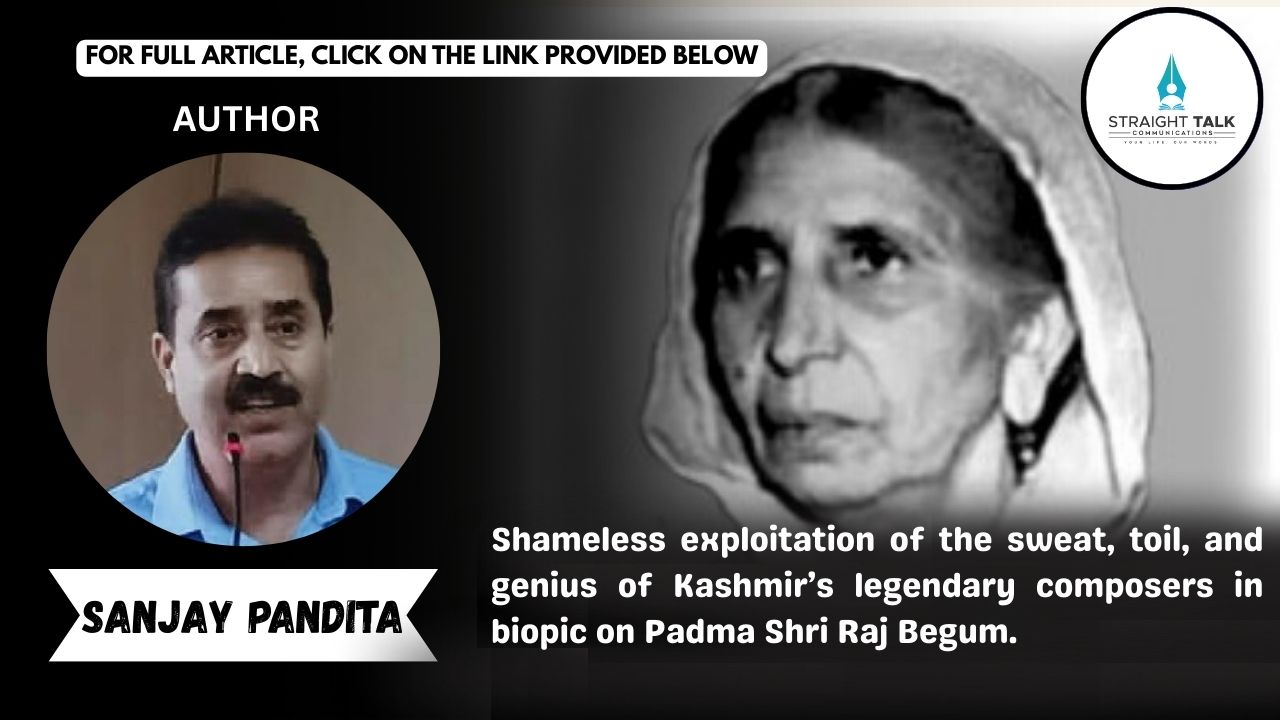A Serious Act Of Cultural Injustice

Shameless exploitation of the sweat, toil, and genius of Kashmir’s legendary composers in biopic on Padma Shri Raj Begum.
Sanjay Pandita
The recently released biopic on Padma Shri Raj Begum, celebrated as a tribute to the “Nightingale of Kashmir,” may glitter on the surface, but beneath its sheen lies a serious act of cultural injustice. The film shamelessly exploits the sweat, toil, and genius of Kashmir’s legendary composers and presents their timeless creations without even a whisper of acknowledgment. It parades Raj Begum’s voice as though it existed in isolation, when in truth it was shaped, elevated, and immortalized by the genius of composers like Qasirkalendee Mohan Lal Aima, Naseerullah Khan, and Bhajan Sopori.
These stalwarts were not accompanists to history—they were the very spine of Kashmiri music. Mohan Lal Aima gave structure to her melodies; Naseerullah Khan infused them with emotional depth; Bhajan Sopori gave them spiritual resonance. Without their creative brilliance, Raj Begum’s voice would never have reached the ethereal heights it did. To delete their names from the narrative and falsely credit others is nothing less than plagiarism dressed up as homage.
The film Songs of Paradise may dazzle with its beautifully sung old numbers, and Abhay Sopori’s recreated scores certainly deserve appreciation, but the question remains: can recreation justify erasure? Can a tribute be honest when it silences the very hands that built the foundation of what is being celebrated? The answer is a resounding no. By stripping the original composers of their due credit, the makers of this film have not only disrespected Kashmiri music but also insulted the very cultural soil from which Raj Begum’s voice blossomed.
This is not a question of diminishing Raj Begum’s towering stature—she will always remain Kashmir’s pride. But to inflate her legacy by erasing the contribution of her composers is to distort truth and history. It rewrites memory, creating a dangerous precedent where one artist’s greatness is exaggerated at the cost of others who made it possible.
Cultural bodies, institutions, and authorities must step in before this distortion becomes normalized. Silence here would be complicity. The least that could have been done was to honor Mohan Lal Aima, Naseerullah Khan, and Bhajan Sopori for their roles in crafting the very songs that the film is now profiting from. Their omission is not a slip—it is an exploitation, a theft of memory.
Kashmir’s music is not the story of one voice, no matter how divine. It is a collective symphony of poets, composers, instrumentalists, and singers. To call this biopic a “tribute” without giving credit where it is due is to mock that collective spirit. A true tribute does not steal—it honors. Until we correct this wrong, Songs of Paradise will remain less a song of paradise and more a note of betrayal.
(The views are of the author and not of the Straight Talk Communications)







